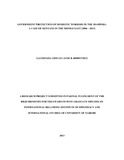| dc.description.abstract | The main objective of the study was to analyze the role of the government of Kenya in the
protection of domestic workers in the Diaspora. Specifically, the study sought: to evaluate the
initiatives that the Government of Kenya has taken towards the protection of domestic workers
in the Middle East, and to establish the role of the foreign affairs office in the protection of
domestic workers in the Diaspora. This research was based on the case of Diaspora domestic
workers in the Middle East. Qualitative data was collected for the study. Primary data was
collected through a purposive sample of eighteen respondents who were interviewed from the
ministry of foreign affairs and the relevant staff of various embassies to the countries in the
Middle East. Interviews at the ministry of foreign affairs were done with a representative from
the Directorate of Diaspora Affairs, the Directorate of Consular Affairs and their respective
subordinates. The rest of the interviews were done with the Secretary of Consular affairs and an
Administrative Attaché at: the Saudi Embassy Kenya, Israeli Embassy Kenya, Qatar Embassy
Kenya and United Arab Emirates Kenya. In addition, an interview was also conducted with a
representative from the Ministry of Labour. A separate interview was conducted with domestic
workers from the Middle East. The data collected was then analyzed using content analysis
technique.
The findings showed that Kenyans migrate to the Middle East to be employed as domestic
workers because of lack of employment and the attraction of better pay. However, domestic
workers worked under deplorable working conditions. Comparatively, the findings showed
that employment conditions were harsher in Middle East compared to Kenya. The temporary
ban by the government was perceived as not effective. However, power politics did not play a
role in the challenge of Kenyan protecting domestic workers in the Middle East. The findings
showed that there have been notable improvements in the handling of the plight of Kenyan
domestic workers in the Middle East following the recent media highlight. A common theme
that prominently stood out was that the issue of fake recruitment agencies which was in the
docket of the Ministry of Labour. The findings have shown that the Ministry of Foreign
Affairs has taken a raft of initiatives including joint inter-ministerial committees, Draft
Bilateral Agreements and stakeholders meetings.
xiii
The government should fast-track the bilateral agreements with the receiving countries as this
will resolve the question of policy and provide the basis for enforcement of labour laws in
these countries. In the mean time, the government should curb ignorance on the part of
migrants by disseminating information about the realities of employment conditions in these
countries. It should compel recruiting agents to prepare the migrants by training them and
exposing them to the Arab’s culture, customs, religion and beliefs before they can qualify to
travel to the Middle East. The government should also improve the employment conditions of
domestic workers at home by working in collaboration with employers and other agencies to
train these workers and give incentives such as subsidies to compliant households. | en |

